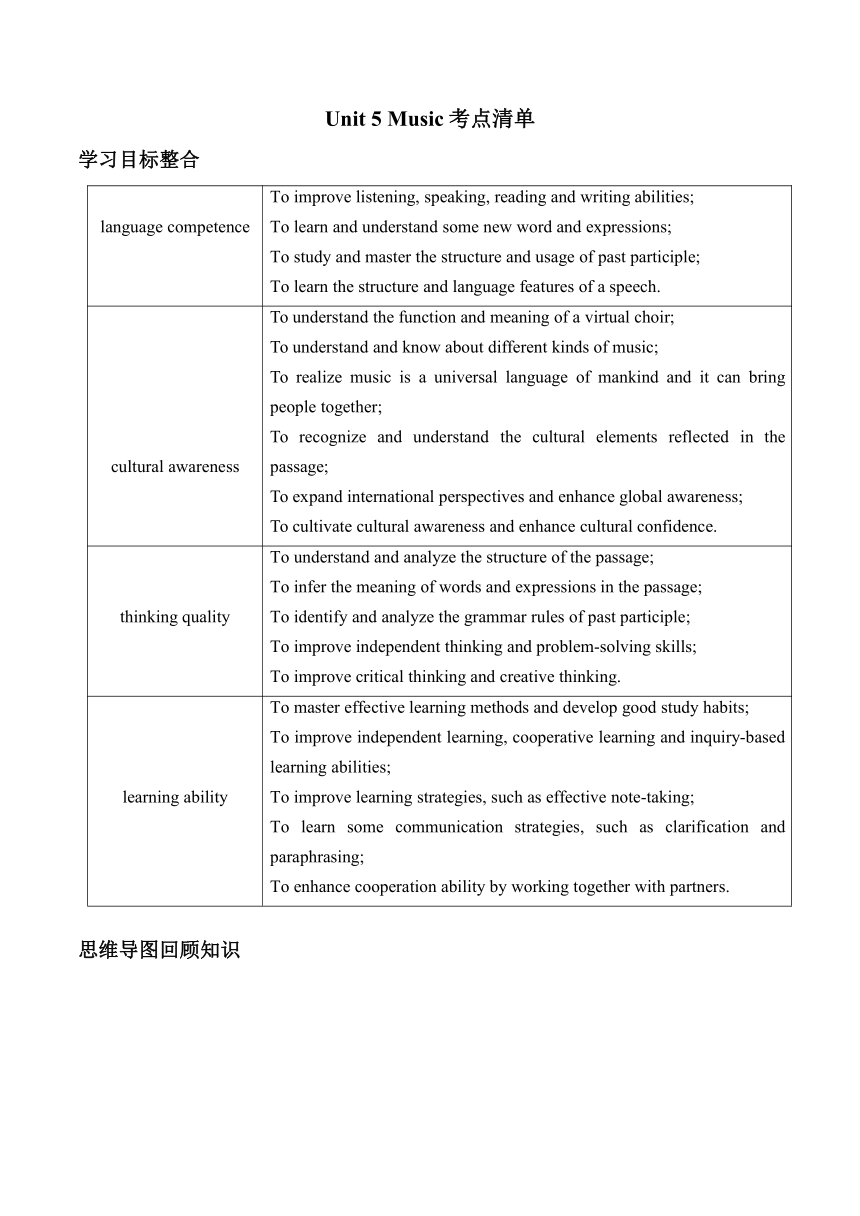
Unit 5 Music考点清单 学习目标整合 language competence To improve listening, speaking, reading and writing abilities; To learn and understand some new word and expressions; To study and master the structure and usage of past participle; To learn the structure and language features of a speech. cultural awareness To understand the function and meaning of a virtual choir; To understand and know about different kinds of music; To realize music is a universal language of mankind and it can bring people together; To recognize and understand the cultural elements reflected in the passage; To expand international perspectives and enhance global awareness; To cultivate cultural awareness and enhance cultural confidence. thinking quality To understand and analyze the structure of the passage; To infer the meaning of words and expressions in the passage; To identify and analyze the grammar rules of past participle; To improve independent thinking and problem-solving skills; To improve critical thinking and creative thinking. learning ability To master effective learning methods and develop good study habits; To improve independent learning, cooperative learning and inquiry-based learning abilities; To improve learning strategies, such as effective note-taking; To learn some communication strategies, such as clarification and paraphrasing; To enhance cooperation ability by working together with partners. 思维导图回顾知识 重难知识易混易错 过去分词作表语和状语 一、过去分词作表语 1. 过去分词放在系动词be, get, feel, remain, seem, become等后作表语,多为及物动词变化而来的,有被动意味,表示主语所处的状态。 He became annoyed with the students. 他非常生学生的气。 Are you married or single 你是已婚还是单身? He seems well qualified for the job. 他好像非常胜任这个工作。 2. 少数不及物动词的过去分词也可以作表语,只有完成的意思,也说明主语所处的状态。 Gone are the days(=The days are gone) when my heart was young and gay. 我的心又年轻又愉快的日子一去不复返了。 The sun is set. Let’s go home. 太阳落山了,我们回家吧。 3. 过去分词作表语与被动语态的区别: 过去分词作表语表示状态,而被动语态表示被动的动作。 The cup is broken. 那个茶杯打碎了。 (指茶杯现在的状态,系表结构) The cup was broken by Tom when he took it to the living room. 那个是汤姆打碎的,当时他正把它拿到客厅去。 (指过去动作,被动语态) 4. 与感觉有关的动词的现在分词和过去分词的区别: 与感觉有关的及物动词的意思都是“使(某人)……”,其现在分词表示主动意义,即“令人有某种感觉的”;过去分词表示被动意义,即“人被引起某种感觉的”,指人“内在的感觉”。如: interest 意思是“使(某人)感兴趣”; interesting 意思为“令人感兴趣的,有趣的”,表示事物的性质; interested 表示“感兴趣的”,表示人内心的感觉。 区别: His novels will interest everyone who reads them. 他的小说会使每位读者感兴趣。 (interest 动词,使......感兴趣) His novels are interesting. 他的小说很有趣。 (interesting 现在分词,有主动意义,指主语的性质) Everyone will be interested in his novels. 每个人都会对他的小说感兴趣。 (interested 过去分词,有被动意义,指人的 ... ...
~~ 您好,已阅读到文档的结尾了 ~~

